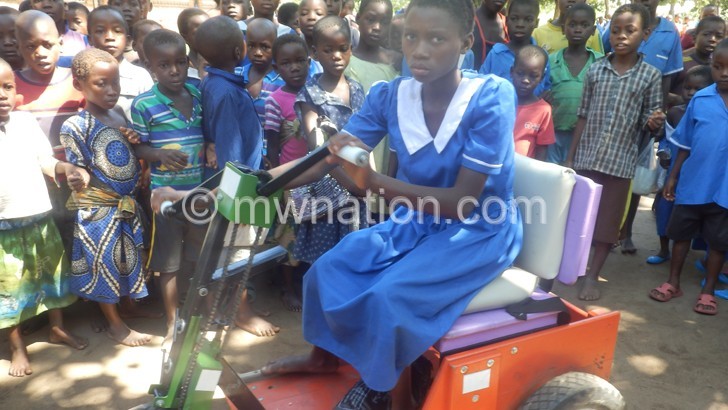Keeping the physically challenged in school
If long distances force children without physical challenges to drop out of school, then think of a physically challenged girl in a poor society that reveres boys’ right to education and negates girls’ education.
Marriam Adini (16), a Standard Four learner at Malombe Primary School in Mangochi District became physically disabled after suffering from polio at the age two.
This has functional limitations that interfere with her ability to use limbs—her legs are weak to commute to school, the distance most children in her area do not manage, as well.
Kulenje Elias, 39, from Kadewere Village in the area of Traditional Authority (T/A) Chowe in the district is Marriam’s mother.

She once played the devil’s advocate on her daughter’s future. She made the daughter drop out of school by giving the family’s bicycle to Marriam’s brother to use when going to and from school.
Her daughter’s plight forced her to neglect her. At that time the single parent-headed household had just relocated to Chowe’s area from T/A Nankumba, where schools are more far apart.
“Marriam’s condition made me think education was important to her brother only,” says Elias. “But the decision riled Marriam to the marrow because she loved school very much.”
Elias says after being advised by Malombe Primary School head teacher Felix Kwakwala and neighbours to get Marriam back to school, she sought assistance from people for her mobility machine to school but it did not materialise.
“Taking away the bicycle from her brother could have made him drop out of school. The school is far from here,” she adds.
Despite the family’s struggles to buy clothes, soap and sometimes food, Marriam is now back in school, commuting on a tricycle, thanks to Malawi Red Cross Society (MRCS) for rescuing her.
MRCS, with support from Namikango Mission Church of Christ, donated the tricycle to Marriam to ease her mobility.
The donation was made through the Community Resilience Project MRCS is implementing in T/A Chowe’s area.
The project is funded by a consortium of four national societies’ namely Danish, Finish, Icelandic and the Italian Red Cross. The four-year (2016 to 2019) project focuses on water, sanitation and hygiene (Wash), health and disaster management, among others.
Marriam is happy about the donation.
“The future is bright because I will finish my education and become a teacher,” says Marriam.
“I will work hard to pass examinations with flying colours. This assistance has changed my life unlike being given food,” she says.
Mangochi District registers high school dropout rate in the country due to poverty that cripples parents’ ability to provide children’s basic needs and bad cultural practices, among others.
Osman Kachoka, 13, a Standard Three pupil at the same school, is also among the beneficiaries of the MRCS project.
Osman’s parents are alive, but they lack resources to provide basic needs for the 11-member family.
He is the seventh born. Unlike Marriam, Osman has one arm. His right arm was amputated. He says he fell down from a mango tree when he was young, hence the amputation.
Kwakwala commended MRCS for the project, citing that it has increased children’s school attendance.
“School enrolment has increased drastically with assistance from MRCS to learners. There will never be a motivation to Marriam’s life greater than the tricycle.
“Her hard-working spirit prompted the school management to take her from Standard Three to Four without sitting for examinations,” says Kwakwala
He, however, laments shortage of teachers and houses, classroom blocks and desks as some of the challenges affecting smooth progress of education at the school.
Apart from assisting learners at Malombe, MRCS also donated very important people (VIP) girls pit latrines and two tricycles to physically challenged learners at Chigumula Primary School in the area.
According to the school’s head teacher, Gift Saidi, the tricycles will ease mobility challenges for the pupils; thereby, making it possible for them to access education.
He said the toilets will help to reduce girls’ absenteeism during menses.
Committed to upholding children’s right to education and as a way of complementing MRCS efforts, T/A Chowe has set by-laws to encourage every parent to send children to school.
“School dropout creates high illiteracy levels that maintain the vicious circle of poverty. By-laws are there to complement efforts of MRCS to keep every child in school,” says Chowe.
Namikango Mission Church of Christ project officer for Malawi, Wilson Isaac Tembo, says his organisation moved in to support MRCS because it is implementing a similar project on education.
MRCS assistant project officer Chisomo Kamwendo Banda said the project aims at lessening challenges that can force children from vulnerable communities to drop-out of school.
“Our aim is to reduce the high school drop out rate in the impact area. We realised that some of the challenges that trigger school drop-out is mobility challenge for physically challenged children.
“We feel addressing it, the children will continue attending school, and reach at the apex with education and secure employment, hence, build community resilience,” she says.
Banda, however, underscored the need for other partners to join forces with MRCS if zero drop-out is to be achieved.
During his first visit to Malawi, president of Iceland Red Cross, Sveinn Kristinsson, pledged support to rural Malawian children on education.
“I am more excited with the numerous efforts our friends in Malawi are doing. This is encouraging because the efforts are good and can build community resilience, which we envision to mitigate the effects of climate change and other unforeseeable circumstances,” he said. n





